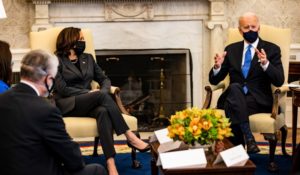
President Donald J. Trump signs an executive order requiring regulatory rollbacks, a federal judge blocks President Trump’s buyout of federal employees, and more…
IN THE NEWS
- President Donald J. Trump signed an executive order titled “Unleashing Prosperity Through Deregulation,” requiring federal agencies to identify at least ten existing regulations to repeal whenever they seek to issue a new one. The order aims to reduce “unnecessary, burdensome, and costly federal regulations” and requires that the cost of all new regulations be “significantly less than zero” for fiscal year 2025. The order reinstates President Trump’s first-term deregulatory efforts, reversing Biden-era rules and lowering review thresholds for new regulations. Critics argue that the policy prioritizes deregulation over public protections, while supporters claim it will boost economic growth and government efficiency.
- A federal judge in Massachusetts temporarily blocked the Trump Administration’s proposed buyout of federal employees. Labor unions have challenged the buyout, which incentivized employees to resign in exchange for pay through October to reduce the federal workforce. The unions argue that President Trump cannot guarantee the buyout will be funded, has failed to consider the consequences of mass resignations on the government’s ability to function, and lacks a legal basis for the buyout. The buyout has been delayed until February 10.
- President Trump signed a memorandum addressing collective bargaining agreements finalized by the Biden Administration. The memorandum characterizes these agreements as an attempt to extend prior policies and constrain the new administration’s authority. The memorandum states that agreements executed within 30 days before the presidential transition that create new obligations, make substantive changes, or extend existing agreements “shall” not be approved by agency heads. This action reflects the Trump Administration’s stance against last-minute agreements, which it claims “run counter to America’s system of democratic self-government.”
- The U.S. Department of Homeland Security (DHS) terminated its 2023 Temporary Protected Status (TPS) designation for Venezuela, which allowed covered Venezuelan nationals to remain temporarily in the United States due to “extraordinary” conditions that prevented their safe return to Venezuela. DHS based its decision on its findings that there have been “notable improvements” in Venezuela’s economy, public health, and crime and stated that extending TPS for these individuals would be “contrary to the national interest.” The termination will not affect individuals registered under DHS’s 2021 TPS designation for Venezuela.
- New York Governor Kathy Hochul (D-NY) signed into law a bill to protect doctors who prescribe and mail abortion pills to patients in states where the procedure is restricted, shielding them from legal action by those states. The new measure allows prescribers to use their practice name and address on prescription labels for mifepristone, misoprostol, and generic alternatives, instead of their personal information. Pharmacies are also required to notify patients and assist in implementing this protection. The law prevents New York authorities from cooperating with out-of-state investigations or prosecutions related to abortion medication prescribed within the state’s jurisdiction. The law is part of a broader national trend of states with strong abortion protections pushing back against restrictions imposed in other states.
- Federal Reserve Governor Michelle Bowman delivered a speech on the future of banking regulation, emphasizing the need for a tailored regulatory framework that reflects the varying complexities of financial institutions. She suggested a problem-focused approach to supervision, which consists of identifying regulatory challenges, determining the appropriate authority to address them, and exploring different solutions. Governor Bowman also highlighted the critical role of innovation within the banking system to promote economic growth and adapt to the evolving financial landscape.
WHAT WE’RE READING THIS WEEK
- In a recent Brookings Institution article, Wendell Primus, a visiting fellow, and Chloe Zilkha, a senior research assistant, both at the Brookings Institution, argued that automating the application processes for Supplemental Security Income (SSI) and the Supplemental Nutrition Assistance Program (SNAP) can reduce poverty among older and disabled adults. Primus and Zilkha noted that the participation rates of older adults in SSI and SNAP are “exceedingly low,” largely due to administrative hurdles such as complicated forms and stringent asset limits that make access to these programs “far more difficult than it should be.” Primus and Zilkha contended that simplifying enrollment processes could raise awareness, encourage higher participation in SSI and SNAP, and ensure that “all eligible older adults are granted the same application resources.”
- In a recent Brookings Institution article, Robert E. Litan, a senior fellow at the Brookings Institution, and Peter M. Shane, a distinguished scholar in residence at NYU Law School, argued that President Trump’s goal of reducing both the number of federal civil servants and the volume of federal regulations will likely face a “wave of legal challenges.” Litan and Shane predicted that environmental and public interest groups, as well as state attorneys general, will challenge President Trump’s actions, pointing out that the first Trump Administration’s “record defending regulatory actions in court was the worst among recent presidents.” Litan and Shane noted that the Trump Administration might “concentrate on rescinding many ‘non-significant’ or minor rules” or attempt to “roll back many significant rules in the presumed hope” that the rescissions will be treated more favorably in the federal courts than during President Trump’s first term.
- In an article published in Urban Geography, Mateja Kovacic, an assistant professor at Hong Kong Baptist University, and Simon Marvin and Aidan While, professors at the University of Sheffield, argued that the current patchwork of regulatory approaches to sidewalk delivery robots creates inconsistencies that hinder innovation. Kovacic, Marvin, and While highlighted that robots are deployed in complex urban environments, creating challenges to pedestrian safety and public access. They examined how municipalities in California have adopted varying regulatory approaches, ranging from permissive to prohibitive. Kovacic, Marvin, and While suggested that instead of reactive and fragmented policies, regulators should develop proactive, standardized frameworks that balance innovation with public safety, ensuring that sidewalk delivery robots are integrated into urban spaces without compromising pedestrian rights or city infrastructure.
EDITOR’S CHOICE
- In an essay in The Regulatory Review, Eloise Pasachoff, the Agnes Williams Sesquicentennial Professor of Law at the Georgetown University Law Center, examined the significant yet often overlooked role of the Office of Management and Budget’s (OMB) Resource Management Offices (RMOs) in shaping federal agency policies through budgetary oversight. Pasachoff explained that, unlike the better-known Office of Information and Regulatory Affairs (OIRA), RMOs influence agency priorities by controlling budget proposals, approvals, and execution. She noted that this influence extends even to independent agencies, which are not subject to OIRA’s regulatory review but remain under OMB’s budgetary control. Pasachoff argued that, while RMOs serve a crucial coordinating function, their lack of transparency raises accountability concerns, as their decisions often shape agency policies with little public scrutiny. She proposed increasing oversight through executive orders or congressional inquiries to ensure RMO decisions align with presidential priorities and maintain democratic accountability.



